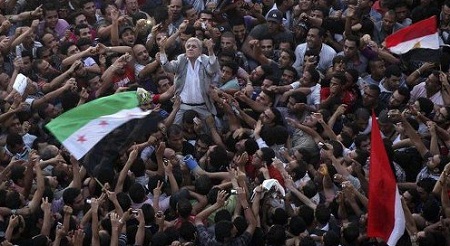In the aftermath of the first round of Egypt’s presidential election, there seemed to be two possibilities in the face of this weekend’s runoff between the Muslim Brotherhood’s candidate, Mohammed Morsi, and former Mubarak prime minister Ahmed Shafiq: ![]()
The first scenario would have seen Morsi announce a very broad-based campaign, downplaying the Islamism of his candidacy and emphasizing the moderation of the Muslim Brotherhood (especially vis-a-vis the Salafist Al-Nour party), drawing in secular figures and promising a pro-revolutionary administration that would focus on economic issues, making sufficient concessions to win support from the runners-up of the contest, such as neo-Nasserite Hamdeen Sabahi, the all-things-to-all-people moderate Islamist Abdel Moneim Aboul Fotouh and former Arab League Secretary-General Amr Moussa, as well as other key figures, such as Mohamed ElBaradei, the former head of the International Atomic Energy Agency.
The second scenario would be one in which the main liberal, secular and pro-revolution political figures refuse to endorse either Morsi or Shafiq (given that Shafiq is seen as “felool,” the remnants of the Mubarak regime and the standard-bearer for the reactionary elements of Egypt’s so-called “deep state,” including the governing Supreme Council of the Armed Forces, it was never likely that any of Egypt’s moderates would rally around him), thereby de-legitimizing, in part, whomever wins the election on June 16 and 17.
As it turns out, it’s the second scenario that’s come to pass: ElBaradei returned to Cairo this week — he had been in Vienna for the first round — calling for the elections to be cancelled and the constitution to be amended.
Aboul Fotouh has refused to endorse either candidate and released a four-point program for Egypt’s next president — he said that Shafiq is Mubarak’s candidate, his participation is illegal and that Shafiq belongs in prison. Moussa, even as voting took place in the first round, was already calling on Shafiq to drop out of the race.
Sabahi, for his part, has been even more emphatic in his refusal to endorse, joining protests last week in Tahrir Square and calling on the elections to be suspended.
Morsi finished first in the May election with 25% of the vote to just 24% for Shafiq; although Sabahi won Alexandria, Cairo and much of the urban electorate, he was edged into third place with just 21% support, followed by Aboul Fotouh in fourth place at 17% and Moussa in fifth place at 11%.
The disappointing shift in the presidential race has taken place against the backdrop of near-daily landmark twists and turns for the new Egyptian governing order:
- Just two weekends ago, former Egyptian president Hosni Mubarak was sentenced to life imprisonment for his role in killing demonstrators last year.
- Ongoing protesters in Tahrir Square are now out in force, protesting Mubarak’s light sentence and also in support of the Political Isolation Law, which would bar Shariq and other top Mubarak officials from serving in Egypt’s government for ten years — Egypt’s Supreme Constitutional Court makes a ruling on this very issue tomorrow, but it is seen as very unlikely that Shafiq will be disqualified).
- Egypt’s parliament reached a deal to appoint a Constituent Assembly comprised 50-50 of Islamists and non-Islamists to draft Egypt’s new constitution.
But far from being an opportunity for the Muslim Brotherhood to find common cause, public opinion since the first round has hardened against both Morsi and Shafiq– the runoff is now seen as a choice between two tired paths, neither of which have offered Egyptians much in the past four decades since Nasser: semi-authoritarian “security” versus the unknown Islamism of the Brotherhood, leaving the broad ‘civil state’ Madaniyya— Egypt’s secular moderates, liberal democrats, the underemployed youth, the underemployed urban and other pro-revolutionary Egyptians — without a true voice in the runoff:
Non-Islamist groups accuse the Muslim Brotherhood of dragging its feet over guarantees for a civilian state because it believes [Morsi] will win. In the meantime, the Brotherhood wants them to support [Morsi] under the banner of “saving of the revolution” without offering anything in return. Mistrust of the Brotherhood has grown since the revolt against Mubarak ended and, together with the Salafist Nour Party, it won nearly 70 per cent of parliamentary seats. Non-Islamist parties say the Brotherhood refused to support them during a series of bloody clashes against the military when they were demanding a clear timetable for the return to civil rule. They also claim the political Islamic group is seeking to monopolise the executive, the legislative, and the judiciary, effectively replicating the one-party system of rule under Mubarak’s National Democratic Party….
“The Brotherhood are here to convince us to vote for [Morsi],” said Tahani Lashin, an activist with the Popular Socialist Alliance Party. “But they refuse to give any concrete commitments, asking us to trust their promises and good intentions. We tried that many times before and they have never kept their word.”
